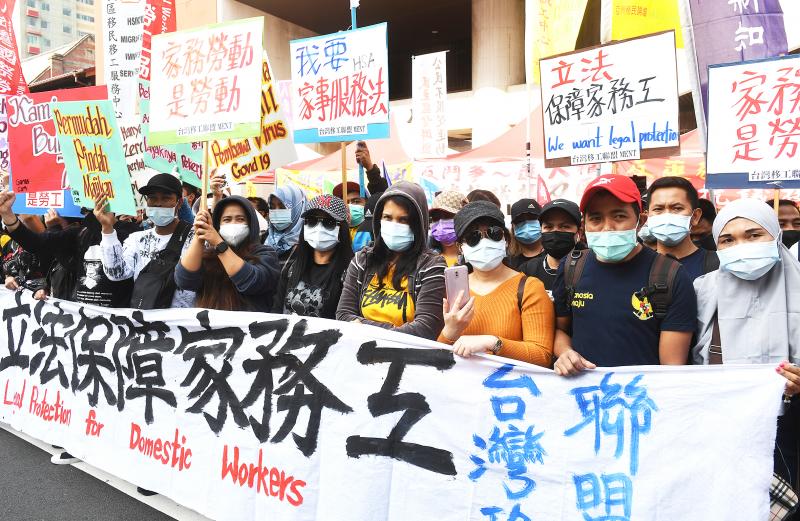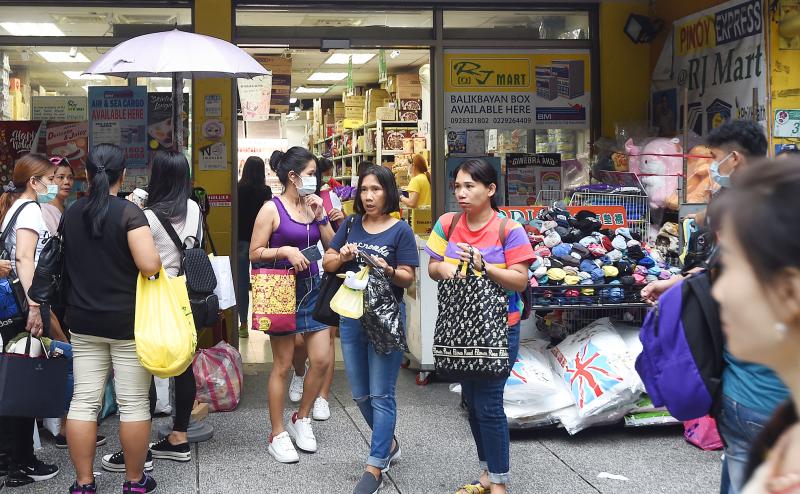A few months ago my girlfriend, a Filipino factory worker here in Taiwan, presents me with a key. They had changed the locks on her dorm and she needs to make a copy.
We run down to the old guy who has a shop in a cubbyhole nearby and he bangs one out in no time. He hands it to her: “NT$40.”
She looks at me in frustration. “My broker wanted NT$200 to copy a key.”

Photo: CNA
Another time she gets in a taxi at the train station heading to her dorm. The driver tells her the trip has a fixed fare of NT$250. She frowns and calls me to ask how much it is. “NT$200,” I tell her, I take the ride every time I come to see her. Uneasy, the driver watches her talking on the phone for a moment. “Who are you talking to?” he finally demands to know. “My American boyfriend,” she retorts. “Oh.” Pause. “It’s NT$200.”
Everyone is familiar with the overall structure of exploitation and racism that frames the migrant worker experience here in Taiwan (see, for example, Joe Henley’s excellent Migrante, a fictionalized account of the life of a Filipino worker on a Taiwanese fishing boat). The stories of abused workers running away, the brutal overwork of caregivers, the long hours in factories, the low pay — these are things we hear about every day.
But migrant workers here in Taiwan also pay a tax for being the “other” — the everyday drip-drip-drip of small ripoffs, the poverty tax that people without money, power, and property must pay just to live and move about the place. Money owed is not paid. Time is stolen from their lives, with no recompense. They are hemmed in by restrictions of all kinds. And of course, there is the othering.

Photo: Chien Jung-fong, Taipei Times
Once I stopped at a roasted corn stand near my house for a snack when a group of Filipinos from nearby factories rolled up on bicycles.
Smiling, they picked out several ears of corn and handed them to the vendor. She weighed them, then named the price. Smiling still, the group balked at the high cost, and rode off. “Hey!” she yelled at them. “This is not your country!” They hadn’t paid, but they had been othered.
Not just in such small incidents, the otherness of migrant workers is fundamental to their existence here.
In all my years here, though I have been stopped by the police countless times, none have ever asked for my ARC. I don’t even bother to carry it unless I have some specific document to process. I seldom even think about my ARC. But migrant workers must carry their ARC at all times or face punishment if caught without it. They must always view themselves as a precarious other.
Time is drip-drip-drip eroded from their lives. Factory worker dorms are generally situated in an inexpensive location for the employer, not a convenient location for the worker. Some of my Filipino friends commute over an hour each day, unpaid.
You might argue that few workers are paid for their commute, yet few other workers are required to live in a certain place by their employers: they are required by their contract to live in the dorms, although they are adults just like any other worker. Even if they rent a cheap place nearby, as many workers do, they still must pay to live in the dorm.
Because dorms are often located in out of the way places, migrant workers often face the unpalatable choice of paying higher prices for things like fruit to nearby vendors who know they have a captive population, or wasting time on buses or scooters to go to markets farther away.
Moreover, when the company or broker calls meetings in the dorm, it is on the private time of the employees. Sometimes they are assigned tasks such as being the bus leader and oversee taking temperatures and signing in. Naturally that is unpaid work.
Migrant workers are heavily controlled, a situation aggravated by the COVID-19 pandemic. In some dorms they have to sign out to stay overnight or are effectively prevented from staying overnight by having to sign out in the morning and in the evening. In other dorms staying out overnight is not even permitted. There are often other restrictions as well — in some companies they are not allowed on gas scooters, even as passengers.
One of my friends was notified after the Taoyuan COVID-19 cluster emerged that workers in that factory were not to go to Taoyuan and should stay in their home city of Kaohsiung.
If they violate these rules, they will be subject to permanent black marks on their record, making them more difficult to employ, even outside Taiwan.
Recall that many of these workers are mature adults with spouses and children, competent in multiple languages and with experience in several countries. Their Taiwanese counterparts are naturally not treated in the same way.
Generally the company or broker owns the dorms, enabling the firm to claw back some of the salary since they force the migrant workers to pay the company rent. For example, last year after the government forced employers to reduce the number of people in each room, some firms simply shrugged and raised the rent. My girlfriend’s room went from eight people at NT$3,500 a month to seven people at NT$5,000 a month. Her company, which owned the dorm, was making even more.
It goes without saying that these people are crammed into rooms which, if they were rented on the open market, would go for between NT$10,000 and NT$12,000 a month. It is thus hardly surprising that gangsters threatened the legislator who floated the idea of ending the broker system, given how lucrative it is.
In many firms, the company gives a bonus for employees who fulfill their contracts. However firms often withhold that bonus because the workers will use it to leave the country once their contract is finished and go to a better place to work. Last year, at one of the companies I know well, many employees were going to Poland, then a popular destination, to find work. Knowing this, the company refused to pay out bonuses.
The situation is even worse for caregivers. At least factory workers get one or two days off a week. Caregivers, by contrast, often get only one day a month off. Sometimes even that is denied. One friend of mine faced three straight months with no days off. Without time off, humans cannot have lives.
Caregivers often face families that treat them like slaves. Various forms of physical and psychological abuse are common.
One seldom remarked on problem that caregivers have is that they receive no support for handling the trauma they experience whenever a human being that they are caring for a finally dies of disease or old age.
For even in the inhumanity of their everyday existence, they are still able to form bonds of deep love and caring.
They are human.
Notes from Central Taiwan is a column written by long-term resident Michael Turton, who provides incisive commentary informed by three decades of living in and writing about his adoptive country.

April 14 to April 20 In March 1947, Sising Katadrepan urged the government to drop the “high mountain people” (高山族) designation for Indigenous Taiwanese and refer to them as “Taiwan people” (台灣族). He considered the term derogatory, arguing that it made them sound like animals. The Taiwan Provincial Government agreed to stop using the term, stating that Indigenous Taiwanese suffered all sorts of discrimination and oppression under the Japanese and were forced to live in the mountains as outsiders to society. Now, under the new regime, they would be seen as equals, thus they should be henceforth

Last week, the the National Immigration Agency (NIA) told the legislature that more than 10,000 naturalized Taiwanese citizens from the People’s Republic of China (PRC) risked having their citizenship revoked if they failed to provide proof that they had renounced their Chinese household registration within the next three months. Renunciation is required under the Act Governing Relations Between the People of the Taiwan Area and the Mainland Area (臺灣地區與大陸地區人民關係條例), as amended in 2004, though it was only a legal requirement after 2000. Prior to that, it had been only an administrative requirement since the Nationality Act (國籍法) was established in

Three big changes have transformed the landscape of Taiwan’s local patronage factions: Increasing Democratic Progressive Party (DPP) involvement, rising new factions and the Chinese Nationalist Party’s (KMT) significantly weakened control. GREEN FACTIONS It is said that “south of the Zhuoshui River (濁水溪), there is no blue-green divide,” meaning that from Yunlin County south there is no difference between KMT and DPP politicians. This is not always true, but there is more than a grain of truth to it. Traditionally, DPP factions are viewed as national entities, with their primary function to secure plum positions in the party and government. This is not unusual

US President Donald Trump’s bid to take back control of the Panama Canal has put his counterpart Jose Raul Mulino in a difficult position and revived fears in the Central American country that US military bases will return. After Trump vowed to reclaim the interoceanic waterway from Chinese influence, US Defense Secretary Pete Hegseth signed an agreement with the Mulino administration last week for the US to deploy troops in areas adjacent to the canal. For more than two decades, after handing over control of the strategically vital waterway to Panama in 1999 and dismantling the bases that protected it, Washington has